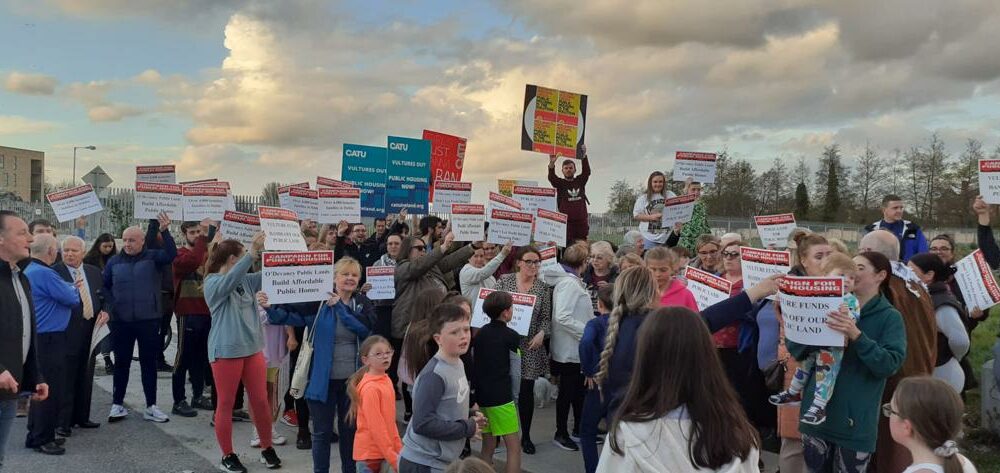The recent announcement that the state plans to allow local councils to buy homes in order to house refugees from Ukraine is another example of the class interests responsible for the present housing “crisis.”
In reality there are more than enough housing units—90,158 vacant dwellings in 2021, according to the Residential Buildings Report. It is not cynical to imagine the present Government’s strategy as being to deliberately focus attention on refugees and away from the landlords, developers and other class forces that use the housing situation for profit.
A former bishop of Cork, Cornelius Lucey, once said that “public housing is akin to Bolshevism. A home-owning citizenry will make more compliant citizens.” This has been the housing policy of the state since the counter-revolution of 1922–23. Building housing for the people was never the objective: the point was to squeeze the most profit possible. If people were left homeless or in sub-standard accommodation, then that was no harm.
Home ownership in the 26 Counties reached a peak in 1991, with 81 per cent owning their own home, but dropped to 67 per cent in 2016, with the figure for young home-owners being half that. This is part of a shift from being one of the highest rates of home ownership in Europe to being one of the lowest.
Contrary to the establishment’s ideology, the fact is that capitalism is what has caused the collapse in home ownership, since a shift towards rental accommodation has proved more profitable than the credit bubble of the “Celtic Tiger” era. And a mere 0.004 per cent of the population own 8 per cent of the houses.
The state is not a neutral force trying to mediate between landlords on one side and renters on the other: the state is the product of the irreconcilability of class antagonisms. The state will need to alleviate the worst of the effects of its housing policy, particularly since some transnational corporations are questioning setting up in Ireland as a result; and it can do so with the use of subsidised charities, co-operative housing bodies, and other means that do not challenge directly the profitisation of housing itself.
The present situation of homelessness and high rents should not be termed a “crisis,” as this implies that it is accidental. Instead, government housing policy is working perfectly well. Schemes such as HAP, RAS and rent supplement allow for massive subsidies from the state to landlords.
Bishop Lucey (probably too honest to be a bishop) said again in 1957: “The man of property is ever against revolutionary change, consequently a factor of the first importance in combating emigration and preventing social unrest and unemployment marches and so on is the widest possible diffusion of ownership.” In 1973 the state introduced a policy whereby residents could buy their council houses for a large discount.
It is not for nothing that we are seeing the beginnings of social movements, now that the shift towards home ownership has ended. At the same time, housing precariousness also has a grip on workers, in that a lack of rental security will hardly encourage people to go on strike, for example. According to Rory Hearne, the State Investment Fund is a part-investor in Finance Ireland, a debt-servicer of mortgage in arrears.
No solution to the state’s housing policy can ignore the obvious and open class interests at play. It is not just a cliché to say that what we need is a class-conscious challenge against the landlords, property developers, and their political and legal representatives. Universal public housing, with rents linked to income, allows us to meet people where they are and to build on this to strike at the heart of a strategic weak point in Irish capitalism. It also opens up the connection with low pay and all the means the capitalist class use to exploit us, at home or in work.
Since it is the Ukrainian refugees that opened up this article, it is worth pointing out that rents in the Soviet Union were a mere 3 per cent of income. That’s what can happen when the property-owning class are removed entirely.
If what Bishop Lucey said was true, so too is the reverse: that struggling for universal public housing, with rents linked to ability to pay, can form a part of developing a collective system, where communities are sustainable and no-one has to worry about having safety and security.
Such a model would no doubt be an attack on the capitalist system as a whole, and eventually on the likes of the European Union and American corporations, i.e. on imperialism. So we shouldn’t squander the opportunity. Capitalism creates its own grave-diggers, and those struggling to work long hours to pay higher and higher rents may prove to be the grave-diggers of the system that created us in the first place.






